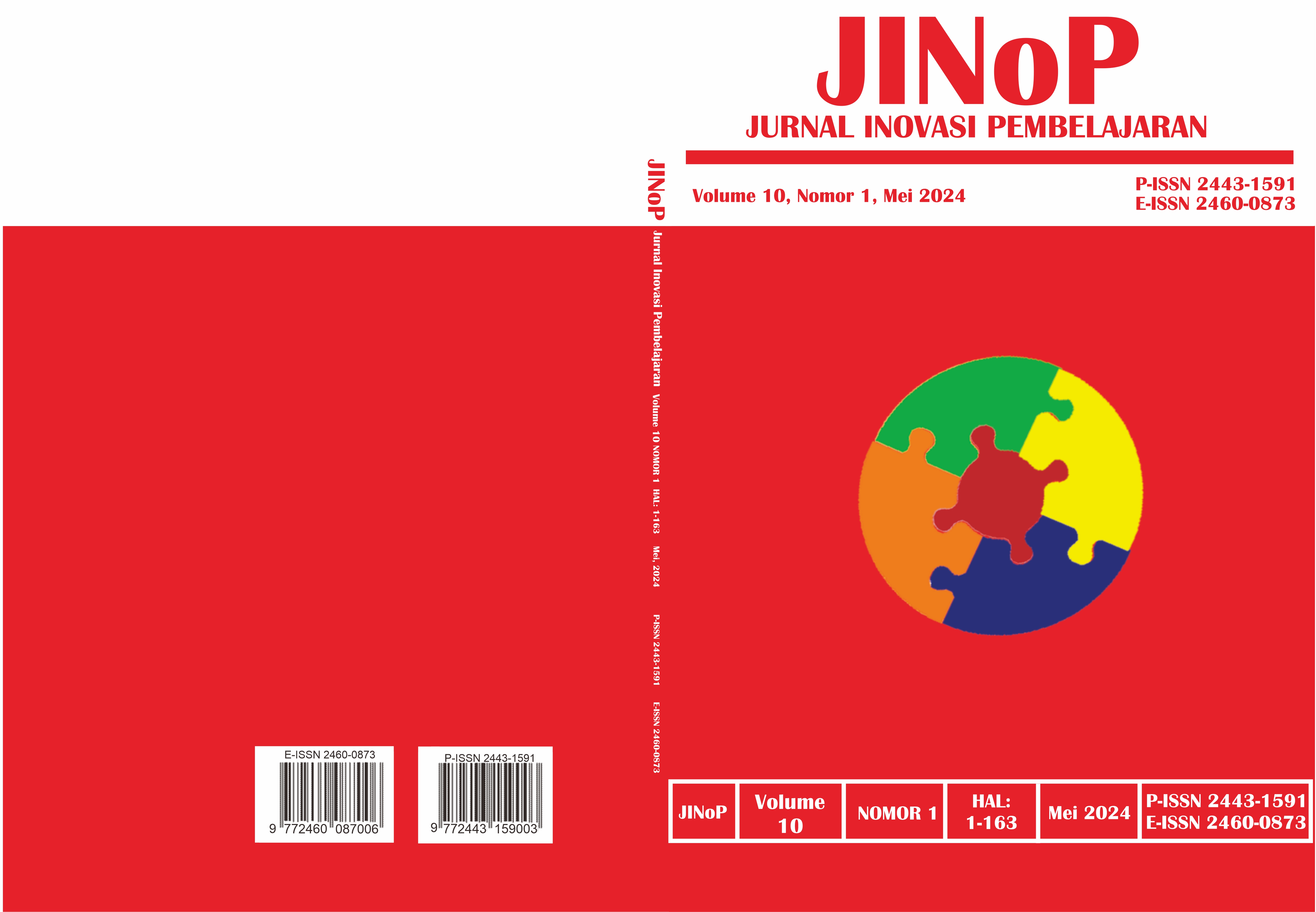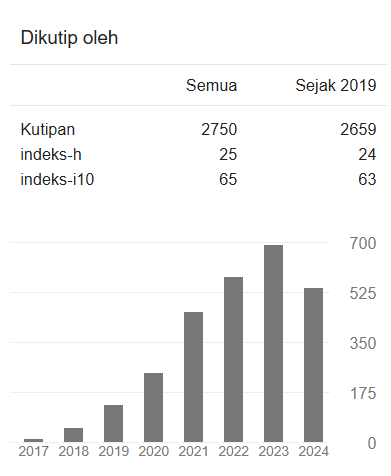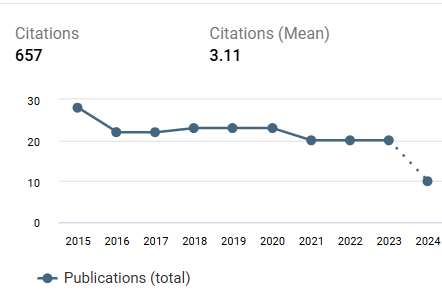The Improving students’ cognitive skill: The use of the project-based learning of STEM Model
DOI:
https://doi.org/10.22219/jinop.v10i1.27138Keywords:
CAR, Cognitive Learning Outcomes, PjBL STEM, ScienceAbstract
Science learning emphasises the provision of direct experience to develop students’ competencies in exploring and understanding the natural surroundings scientifically. However, the science learning process in SDN 2 Bulusan, Indonesia, remains directed at students’ ability to merely remember various information without relating it to their natural surroundings. This impacted students’ ability to understand science only to the extent of rote memorisation. There is a need for an approach that improves students’ cognitive skills to achieve the desired ability. The objectives of this study are: (1) to explain the procedures of Project-based Learning (PjBL) in teaching Science, Technology, Engineering, and Mathematics (STEM); and (2) to improve scientific attitudes and students’ cognitive learning outcomes. This research employed classroom action research (CAR) with two cycles for 13 fifth graders of SDN 2 Bulusan. The data was obtained through interviews, observation, and tests, which were analysed using source triangulation and technique triangulation. The results showed that: (1) PjBL STEM was carried out through reflection, research, discovery, application, and communication; and (2) students’ cognitive learning outcomes have increased as shown through minimum completion criteria, which improved from 76.9% to 92.3%. This finding shows that PjBL STEM potentially improves the cognitive learning outcomes of Indonesian fifth-graders.
Downloads
References
Afriana, J., Anna, P., & Fitriani, A. (2016). Penerapan Project Based Learningn Terintegrasi STEM Untuk Meningkatkan Literasi Sains Siswa Ditinjau dari Gender. Jurnal Inovasi Pendidikan IPA, 2(2), 212–221. https://doi.org/10.21831/jipi.v2i2.8561
Arikunto, S., Suharjono, & Supardi. (2017). Penelitian Tindakan Kelas: Edisi Revisi. Jakarta: Bumi Aksara.
Asih, R. A., & Halisiana, H. T. (2022). Enhancing students’ speaking skills through a game-based learning innovation of a family game show. JINoP (Jurnal Inovasi Pembelajaran), 8(1). https://doi.org/10.22219/jinop.v8i1.20400
Astuti, I., Toto, & Yulisma, L. (2019). Project Based Learning (PjBL) Terintegrasi STEM Untuk Meningkatkan Penguasaan Konsep dan Aktivitas Belajar Siswa. Quagga: Jurnal Pendidikan Dan Biologi, 11(2), 1–12. https://doi.org/10.25134/quagga.v11i2.1915
Davidi, E. I. N., Eliterius, S., & Kanisius, S. (2021). Integrasi Pendekatan STEM (Science, Technology, Engeenering and Mathemati) Untuk Peningkatan Keteramplan Berpikir Kritis Siswa Sekolah Dasar. Scholaria : Jurnal Pendidikan Dan Kebudayan, 11(1), 1–9.
Dwiyanti, I., Supriatna, A. R., & Arita, M. (2021). Studi Fenomenologi Penggunaan E-Modul dalam Pembelajaran Daring Muatan IPA di SD Muhammadiyah 5 Jakarta. Pendas: Jurnal Ilmiah Pendidikan Dasar, 6(1), 20–29. https://doi.org/10.23969/jp.v6i1.4175
Elisabet, E., Relmasira, S. C., & Hardini, A. T. A. (2019). Meningkatkan Motivasi dan Hasil Belajar IPA dengan Menggunakan Model Pembelajaran Project Based Learning (PjBL). Journal of Education Action Research, 3(3), 285–291.
Fatihah, W. (2023). Penerapan Model PjBL Berbasis STEM Untuk Meningkatkan Motivasi Dan Hasil Belajar Pada Pokok Bahasan Hidrokarbon. Ar-Razi Jurnal Ilmiah, 11(2), 98–106.
Fitriani, D. N., Setiyadi, D., & Listiani, I. (2019). Upaya Peningkatan Hasil Belajar dalam Pembelajaran IPA Materi Gaya Magnet dengan model Inquiry Berbantuan LKS pada Peserta Didik Kelas V SD. Jurnal Edukasi Matematika Dan Sanis, 7(2), 65–76. https://doi.org/10.25273/jems.v7i2.5293
Handayani, E. P., & Ayub, S. (2021). Optimalisasi Kompetensi Guru dalam Penerapan PjBL Berbasis STEM Melalui IHT. Jurnal Pendidikan, Sains, Geologi, Dan Geofisika (GeoScienceEdu Journal), 2(2), 47–54.
Hasibuan, A. T., & Prastowo, A. (2019). Konsep Pendidikan Abad 21: Kepemimpinan Dan Pengembangan Sumber Daya Manusia Sd/Mi. MAGISTRA: Media Pengembangan Ilmu Pendidikan Dasar Dan Keislaman, 10(1), 56–68.
Hopkins, D. (2011). Panduan Guru: Penelitian Tindakan Kelas. Yogyakarta: Pustaka Belajar.
Juwantara, R. A. (2019). Analisis Teori Perkembangan Kognitif Piaget Pada Tahap Anak Usia Operasional Konkret 7-12 Tahun Dalam Pembelajaran Matematika. Jurnal Ilmiah Pendidikan Guru Madrasah Ibtidaiyah, 9(1), 27–34. https://doi.org/10.18592/aladzkapgmi.v9i1.3011
Kelley, T. R., & Geoff, J. K. (2016). A Conceptual For Integrated STEM Education. International Journal of STEM Education, 3(11), 1–11. https://doi.org/10.1186/s40594-016-0046-z
Khairiyah, N. (2019). Pendekatan Science, Technology, Engineering dan Mathematics (STEM). Medan: Spasi Media.
Magdalena, I., Nurchayati, A., Suhirman, D. P., & Fathya, N. N. (2023). Implementasi Teori Pengembangan Kognitif Jean Piaget dalam Pembelajaran IPA di Sekolah Dasar. ANWARUL, 3(5), 960–969.
Musyadad, V. F. (2019). Penerapan Model Pembelajaran Problem Based Learning Dalam Meningkatkan Hasil Belajar Siswa Pada Pelajaran IPA Pada Konsep Perubahan Lingkungan Fisik Dan Pengaruhnya Terhadap Daratan. Jurnal Tahsinia, 1(1), 1–13.
Nurhadiyati, A., Rusdinal, & Fitria, Y. (2021). Pengaruh Model Project Based Learningn (PjBL) terhadap Hasil Belajar Siswa di Sekolah Dasar. Jurnal Basicedu, 5(1), 327–333. https://doi.org/10.31004/basicedu.v5i1.684
Nyihana, E. (2021). Metode PjBL (Project Based Learning) Berbasis Scientific Approach dalam Berpikir Kritis dan Komunikatif bagi Siswa. Jawa Barat : CV. Adanu Abimata.
OECD. (2018). What 15-year-old students in Indonesia know and can do. Programme for International Student Assessment (PISA) Result from PISA 2018.
Putriani, J. D., & Hudaidah. (2021). Penerapan Pendidikan Indonesia di Era Revolusi Industri 4.0. Edukatif: Jurnal Ilmu Pendidikan, 3(3), 1–9. https://doi.org/10.31004/edukatif.v3i3.407
Rahma Suriani. (2020). Penerapan Metode Brainstorming Untuk Meningkatkan Hasil Belajar Ipa Siswa Kelas V Sd Inpres 12/79 Lakukang Kecamatan Mare Kebupaten Bone. Eprints Repository Software UNM, 1–12.
Rahmi, R. P., Meli, N., & Kusdar, K. (2022). Penerapan Model Project Based Learning Berbasis Stem Untuk Meningkatkan Hasil Belajar Ipa Siswa Sekolah Dasar. Kompetensi, 15(1), 102–110.
Safira, A. D., Iva, S., & Tunjungsari, S. (2021). Pengembangan Media Pembelajaran Interaktif Berbasis Web Articulate Storyline pada Pembelajaran IPA di Kelas V Sekolah Dasar. Prima Magistra: Jurnal Ilmiah Kependidikan, 2(2), 237–253. https://doi.org/10.37478/jpm.v2i2.1109
Saputra, N., Luvy, S. Z., Ega, G., Jahring, A. R., & Ardian. (2021). Penelitian Tindakan Kelas. Aceh : Yayasan Penerbit Muhammad Zaini.
Sugiyono. (2017). Metode penelitian kuantitatif, kualitatif, R&D. alfabeta.
Surya, A. P., Stefanus, C. R., & Agustina, T. A. H. (2018). Penerapan Model Pembelajaran Project Based Learning (PjBL) Untuk Meningkatkan Hasil Belajar dan Kreatifitas Siswa Kelas III SD Negeri Sidorejo Lor 01 Salatiga. Jurnal Pesona Dasar, 6(1), 1–9. https://doi.org/10.24815/pear.v6i1.10703
Zamil, M. R. R., & Udyaningsih, P. S. (2021). Profil Implementasi Model Connected Pada Pembelajaran IPA di Indonesia: Kajian Literatur 2012-2021. Jurnal Inovasi Penelitian Dan Pengabdian Masyarakat, 1(2), 63–73.
Downloads
Published
How to Cite
Issue
Section
License
Copyright (c) 2024 Lestari et al

This work is licensed under a Creative Commons Attribution 4.0 International License.
Copyright Notice
Authors who publish with JINoP (Jurnal Inoasi Pembelajaran) agree to the following terms:
- For all articles published in the JINoP (Jurnal Inovasi Pembelajaran), copyright is retained by the authors. Authors give permission to the publisher to announce the work with conditions. When the manuscript is accepted for publication, the authors agree to the automatic transfer of the publishing right to the publisher.
- Authors retain copyright and grant the journal the right of first publication with the work simultaneously licensed under a Creative Commons Attribution 4.0 International License. that allows others to share the work with an acknowledgment of the work's authorship and initial publication in this journal.
- Authors are able to enter into separate, additional contractual arrangements for the non-exclusive distribution of the journal's published version of the work (e.g., post it to an institutional repository or publish it in a book), with an acknowledgment of its initial publication in this journal.
- Authors are permitted and encouraged to post their work online (e.g., in institutional repositories or on their website) prior to and during the submission process, as it can lead to productive exchanges, as well as earlier and greater citation of published work (See The Effect of Open Access).








